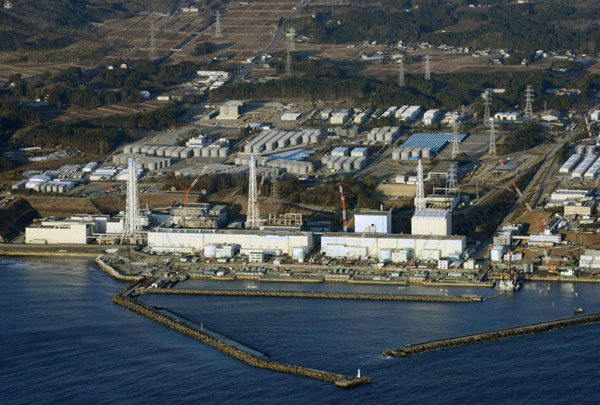Japan govt takes aim at electricity monopolies
Updated: 2013-05-16 10:14
(Agencies)
|
||||||||
 |
|
An aerial view shows Tokyo Electric Power Co's (TEPCO) tsunami-crippled Fukushima Daiichi nuclear power plant in Fukushima Prefecture in this March 11, 2013 file photo. [Photo/Agencies] |
TOKYO - Japan is embarking on its most ambitious attempt at electricity industry reform since 1951, with Prime Minister Shinzo Abe well-positioned for victory in a battle to break up powerful regional monopolies that is seen as a test of his political agenda.
The time is ripe for the government's push to reduce some of the highest electricity costs in the world by opening up the market for competition, with energy companies' public image battered in the wake of the Fukushima nuclear crisis.
Major reform is rare in Japan, but Abe's sweeping plan for the power industry is central to his drive to overhaul the country's economy, as high energy costs would derail efforts to turn back decades of stagnant growth and deflation. The government is pushing for recently submitted legislation to be passed before parliament goes into recess on June 26.
Change won't be easy as the politically well-connected utilities are part of an entrenched web of interests and have resisted attempts since the 1990s to liberalise the industry. The companies and their affiliates have ties with politicians, fund their campaigns and often give government officials executive roles.
"(Japan's power companies) are good for nobody but themselves. So we gotta to get rid of that, energy costs are so expensive," said Taro Kono, a lawmaker in the ruling Liberal Democratic Party, who has long been critical of government support for utilities and says the plans should go further.
The companies, including Tokyo Electric Power Co and Kansai Electric Power Co, still supply almost 98 percent of Japan's electricity and terms for access to their transmission lines make it onerous for new entrants.
Wrenching control of transmission from regional monopolies to create a national grid is also a key issue after the March 2011 earthquake that sparked the Fukushima disaster highlighted the inability to transfer power to areas suffering shortages.
HISTORIC PROPORTIONS
Toshimitsu Motegi, the Minister for Economy, Trade and Industry, told parliament in March that overhauling the market was at the core of attempts to reduce Japan's soaring energy costs, which have pushed it into a record trade deficit.
"This is a major reform of historic proportions, which fundamentally reviews the regional monopoly system that has continued for six decades," he said.
The monopolies, set up in 1951 during the American occupation after World War II, followed the US model at the time, with regional utilities controlling all aspects of power generation and transmission with legally sanctioned profitability.
Tokyo Electric, which before the meltdowns at its Fukushima Daiichi facility was the most powerful utility, is under government control and is being split into separate units. The company will likely be the template for broader change.
"Tepco today is not the same Tepco as the Tepco of the past," said Gerhard Fasol, chief executive officer at consultancy Eurotechnology Japan KK.
Fasol said he expects the industry reforms to be pushed through unless there are significant political changes in the country, one of the last major industrialized economies to attempt to fully liberalise electricity markets.

 Michelle lays roses at site along Berlin Wall
Michelle lays roses at site along Berlin Wall
 Historic space lecture in Tiangong-1 commences
Historic space lecture in Tiangong-1 commences
 'Sopranos' Star James Gandolfini dead at 51
'Sopranos' Star James Gandolfini dead at 51
 UN: Number of refugees hits 18-year high
UN: Number of refugees hits 18-year high
 Slide: Jet exercises from aircraft carrier
Slide: Jet exercises from aircraft carrier
 Talks establish fishery hotline
Talks establish fishery hotline
 Foreign buyers eye Chinese drones
Foreign buyers eye Chinese drones
 UN chief hails China's peacekeepers
UN chief hails China's peacekeepers
Most Viewed
Editor's Picks

|

|

|

|

|

|
Today's Top News
Shenzhou X astronaut gives lecture today
US told to reassess duties on Chinese paper
Chinese seek greater share of satellite market
Russia rejects Obama's nuke cut proposal
US immigration bill sees Senate breakthrough
Brazilian cities revoke fare hikes
Moody's warns on China's local govt debt
Air quality in major cities drops in May
US Weekly

|

|







